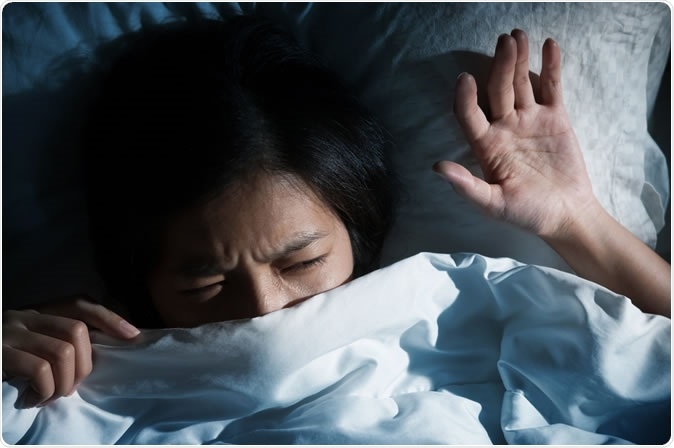Bad dreams or nightmares affect not only children but adults, too. Haunting nightmares can affect a person’s sleep quality and duration, but is it possible to turn off a nightmare while it is happening?
Nightmares, common among adults, are defined as vivid and frightening nocturnal episodes involving intense feelings of failure, humiliation, and dread. However, in about 2 to 6 percent of adults, they experience nightmare disorder, also known as a dream anxiety disorder. It’s a type of sleep disorder characterized by frequent nightmares, which usually occur during the REM stages of sleep.
A study published in the Journal of Clinical Sleep Medicine back in 2010 highlighted the use of various medicines and therapies for other conditions to treat nightmare disorder in adults. Nightmare disorder in adults can stem from stress, the use of certain drugs, and trauma. The study analyzed all available data on nightmare disorder and the treatments available for it.

Image Credit: eggeegg / Shutterstock
Understanding dreams
Before knowing where nightmares come from, it’s essential to know more about why people dream. Currently, there is no convincing explanation for why people dream, but some scientists have linked it to sleep and memory. They believe that dreams reflect a biological process of long-term memory consolidation to strengthen then neural traces of recent events.
Dreams occur in the rapid eye movement (REM) phase of sleep, which is more likely to produce dreams that make people able to do what they want to, for instance, flying.
The REM stage of sleep lasts approximately 90 minutes after falling asleep, and from there, the muscle activity in the body decreases, and dreams happen.
Turning off dreams
There are many medicines and therapies available for nightmare disorder, which are also used in other related disorders. For instance, Prazosin, which is recommended in treating posttraumatic stress disorder (PTSD)-associated nightmares, and Image Rehearsal Therapy (IRT), which is also recommended for those with nightmare disorder.
Other treatments include clonidine, which can be considered a treatment for PTSD-associated nightmares, and systemic desensitization and progressive deep muscle relaxation training, which are used for treating idiopathic nightmares.
In some medicines, they can be recommended but there is little information about their use in treating nightmare disorder, including atypical antipsychotic medications, trazodone, low dose cortisol, topiramate, triazolam, nitrazepam, fluvoxamine, gabapentin, phenelzine, cyproheptadine, and tricyclic antidepressants.
Fighting nightmares
One of the promising new ways to fight nightmare disorder is lucid dreaming, a point at which the dreamer knows he or she is dreaming. During a lucid dream, the person can gain control over the characters of the dream, the environment, and the concept. Because of this, scientists believe that lucid dream training can help treat nightmare disorder in adults.
For instance, though there are limited trials to establish the therapy as a legit medical practice treatment, it has shown promise as a therapy for people with persistent nightmares or nightmare disorder.
Lucid dreaming therapy, which can be done through the wake back to bed method, can help a person have control over his nightmares. For example, people can do this by setting the alarm about 30 minutes before the normal wake up time. When the alarm goes off, refrain from waking up, but think about having a lucid dream as you fall back to sleep.
Though there is no guarantee it’ll work on everyone, it provides dreamers a sense of control over their dreams, eliminating unwanted feelings and dreams.
However, for those with persistent nightmares, it’s essential to see a sleep specialist determine the cause of the condition and develop methods to treat nightmare disorder.
What is Nightmare Disorder? (Symptoms, Causes, Treatment, Prevention)
Journal reference:
Aurora, R Nisha et al. “Best practice guide for the treatment of nightmare disorder in adults.” Journal of clinical sleep medicine : JCSM : official publication of the American Academy of Sleep Medicine vol. 6,4 (2010): 389-401. https://www.ncbi.nlm.nih.gov/pmc/articles/PMC2919672/